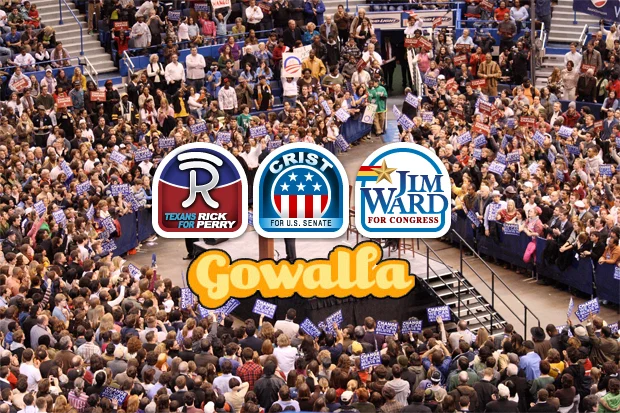
President Obama has been heralded as our first tech-savvy commander in chief. He’s been lauded for his masterfully run campaign, that rode the grassroots wave on the heels of social media and the digital age. And since then, no pol wants to miss a beat. Facebook and Twitter are now essential tools for communication; speeches and ads are uploaded to YouTube; blogs are commonplace; and it seems every communications director is keeping an eye out for the next big technology that’ll revolutionize campaigns. Is this necessary? No, and here’s why.
Today, Gowalla launched a new campaign toolkit aimed at helping politicians rally constituents at campaign events. The geo-location service, which allows users to “check in” via smartphones at various locations (restaurants, bars, coffee shops, etc.), will soon be aiding candidates in drawing in constituents to town halls, campaign fundraisers, and rallies. The new platform enables politicians and campaigns to create events where Gowalla users can “check in” to receive candidate-branded passport stamps for their support.
 And this new toolkit is already gaining steam among pols, who are quick to jump on the next hot campaign tech. Govs. Rick Perry of Texas and Charlie Crist are both on board, having already created their own branded stamps for upcoming election bouts in November. So has Arizona congressional candidate Jim Ward. It’s worth noting that all three are Republican, a sign of just how much has changed since 2008, when the GOP was chastised for its lack of tech savvy. (They recently passed Dems on Twitter, too.)
And this new toolkit is already gaining steam among pols, who are quick to jump on the next hot campaign tech. Govs. Rick Perry of Texas and Charlie Crist are both on board, having already created their own branded stamps for upcoming election bouts in November. So has Arizona congressional candidate Jim Ward. It’s worth noting that all three are Republican, a sign of just how much has changed since 2008, when the GOP was chastised for its lack of tech savvy. (They recently passed Dems on Twitter, too.)
But will keeping on the bleeding edge of technology create an actual edge in the mid-terms? Not likely. Gowalla, for instance, has a fractional number of users than Foursquare–just some 300,000. Spread those users across each state, then divide that number by those who actually care about politics and those who are party-affiliated, and this new campaign tool cannot possibly have a significant impact. Take Rick Perry. How many Gowalla users are there in Texas? Of that number, how many are Republican? And of that number, how many are motivated enough by “check ins” and stamps to actually attend a Perry fundraiser?
“In certain places, there is enough density to move the needle,” says Josh Williams, CEO of Gowalla. “This fall we’ll see the early adopter crowd, who’ll be dry running the technology and help us make a better product.”
Certainly, Gowalla has found a new potential revenue stream from politicians who are eager if not desperate to latch onto the next digital tool that’ll save their floundering campaigns. However, Gowalla and other similar startup services are not large enough yet to get the vote out like Facebook, Twitter, and YouTube, especially on state elections. But that doesn’t mean geo-location services won’t play a big role in the coming years.
“Location services like Gowalla are going to hit a sweet spot for the presidential election,” says Williams. “Two years from now, we’re really going to see these services having a remarkable impact.”
Until then, candidates, don’t expect geo-location to help you find large numbers of voters.
Recognize your brand’s excellence by applying to this year’s Brands That Matter Awards before the early-rate deadline, May 3.